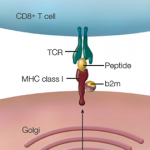The combination of autoantibodies and anti-gluten CD4 T cell immunity appears to not be enough to achieve the tissue destruction seen in patients with celiac disease. Rather, research suggests that these patients have an expansion of effector IE-CTLs with as yet undefined specificity. These IE-CTLs appear to recognize non-classical MHC Class I molecules and, when provided with help from anti-gluten CD4 T cells and upregulation of IL-15, may develop a fully activated killer phenotype. Thus, an inflammatory milieu appears to promote the development of effector IE-CTLs that seem to be required for tissue destruction in patients with celiac disease.
Lara C. Pullen, PhD, is a medical writer based in the Chicago area.
ad goes here:advert-1
ADVERTISEMENT
SCROLL TO CONTINUE
Reference
- Jabri B, Sollid LM. T cells in celiac disease. J Immunol. 2017 Apr 15;198(8):3005–3014. doi: 10.4049/jimmunol.1601693.


